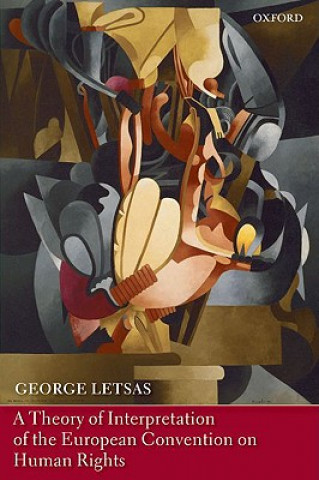
Kód: 01240563
Theory of Interpretation of the European Convention on Human Rights
Autor George Letsas
This book looks at both how the European Convention on Human Rights has been interpreted and how it ought to be interpreted. Unlike a purely doctrinal approach, it aims at proposing an evaluative theory of interpretation for the E ... celý popis
- Jazyk:
 Angličtina
Angličtina - Vazba: Brožovaná
- Počet stran: 176
Nakladatelství: Oxford University Press, 2009
- Více informací o knize

Mohlo by se vám také líbit
-

Theory of Interpretation of the European Convention on Human Rights
4649 Kč -

Sceptical Essays on Human Rights
1947 Kč -

Legitimacy of International Human Rights Regimes
1088 Kč -

Proportionality and the Rule of Law
1117 Kč -

Theory and Practice of the European Convention on Human Rights, 5th edition (hardcover)
6711 Kč -

Legislated Rights
3413 Kč -

European Convention on Human Rights
2276 Kč -

Jacobs, White, and Ovey: The European Convention on Human Rights
1512 Kč -

Human Rights: A Very Short Introduction
249 Kč -

Cases, Materials, and Commentary on the European Convention on Human Rights
2233 Kč -

General Principles of the European Convention on Human Rights
1503 Kč -

Public Records Law for North Carolina Local Governments
2530 Kč -

Housing Design Handbook
1855 Kč -

STOLEN HEIR
389 Kč -

Antisocial
476 Kč -

Gruffalo Touch and Feel Book
203 Kč -

Meg and Greg: Frank and the Skunk
428 Kč -

Seasons of the Witch: Samhain Oracle
627 Kč -

Tractatus Logico-Philosophicus (Chiron Academic Press - The Original Authoritative Edition)
196 Kč -

Drawing on the Right Side of the Brain
467 Kč -

Whispers of Love Oracle
560 Kč -

Machine Learning for Algorithmic Trading
1503 Kč -

Office One Quote A Day
245 Kč -

Writing for First (FCE)
1296 Kč -

Cambridge English Proficiency 1 for Updated Exam Self-study Pack (Student's Book with Answers and Audio CDs (2))
1189 Kč -

Homosexuality and the European Court of Human Rights
5060 Kč -

Magna Carta
356 Kč -

Body Language - Learn How to Read Others and Communicate with Confidence
356 Kč -

Neo4j High Performance
935 Kč -

Desert Dawn
303 Kč -

Lord of the Rings Instrumental Solos for Strings
428 Kč -

Dear Leader
463 Kč -

Dead Man's Walk
343 Kč -

Legal Analyst - A Toolkit for Thinking about the Law
954 Kč -

Ecology of Law: Toward a Legal System in Tune with Nature and Community
692 Kč -

Theorie der juristischen Argumentation
597 Kč -

Reine Rechtslehre
760 Kč -

Světové výstavy EXPO
164 Kč -

Punk 57
341 Kč -

Ch?re Mamie au pays du confinement
238 Kč -

Kurshefte Geschichte - Allgemeine Ausgabe
679 Kč -

ZOO
142 Kč
Darujte tuto knihu ještě dnes
- Objednejte knihu a zvolte Zaslat jako dárek.
- Obratem obdržíte darovací poukaz na knihu, který můžete ihned předat obdarovanému.
- Knihu zašleme na adresu obdarovaného, o nic se nestaráte.
Více informací o knize Theory of Interpretation of the European Convention on Human Rights
Nákupem získáte 189 bodů
 Anotace knihy
Anotace knihy
This book looks at both how the European Convention on Human Rights has been interpreted and how it ought to be interpreted. Unlike a purely doctrinal approach, it aims at proposing an evaluative theory of interpretation for the European Convention on Human Rights. And unlike a purely normative account, it seeks to locate interpretive values within the history of the ECHR by surveying and analysing all the relevant judgements of the European Court of Human Rights. Consequently, the book discusses cases as much as it discusses philosophical theories, seeking to strike the appropriate balance between the two. Recent developments have raised mportant jurisprudential issues in relation to the interpretation of the ECHR which point to the relationship between the two foundational principles of a supranational human rights system: state sovereignty on one hand and the universality of human rights on the other. This book analyses the idea that creative interpretation and choice in interpretation amounts, by default, to illegitimate discretion and is used to wave the flag of judicial self-restraint.It balances this against the inconsistency or lack of clarity in the methods used by the Court, most notably the margin of appreciation doctrine, and looks at the criticism often levelled at the Court that its use of the doctrine masks the real basis for its decisions. The cases that have been coming before the European Court of Human Rights in recent years pose serious interpretive challenges. Does the right to life under art. 2 ECHR include the right to terminate one's life? Does the right to private life under article 8 ECHR include the right to sleep at night free from airplane noise? Does the right to property under art. 1 Protocol 1 ECHR entitle the former King of Greece to claim compensation for the expropriation of royal property, following a referendum? Do homosexual couples have a right to adopt under art. 8 ECHR? This book argues that how law should be interpreted, and what legal rights individuals have, are important questions of political morality that are both capable, and in need of, principled justification.Finally, the book argues that evolutive interpretation does not refer to how most European member states now understand their obligations under the Convention but to how they should understand them given the egalitarian values that they share, and defents the idea of an emerging consensus combined with a theory of autonomous concepts as a way to provide the appropriate authority for the Court to adopt an egalitarian theory of human rights.
 Parametry knihy
Parametry knihy
Zařazení knihy Knihy v angličtině Law Laws of Specific jurisdictions Constitutional & administrative law
1886 Kč
- Plný název: Theory of Interpretation of the European Convention on Human Rights
- Autor: George Letsas
- Jazyk:
 Angličtina
Angličtina - Vazba: Brožovaná
- Počet stran: 176
- EAN: 9780199563883
- ISBN: 0199563888
- ID: 01240563
- Nakladatelství: Oxford University Press
- Hmotnost: 274 g
- Rozměry: 236 × 166 × 11 mm
- Datum vydání: 26. February 2009
Oblíbené z jiného soudku
-

Equal Rights Handbook
301 Kč -

Matter of Interpretation
465 Kč -

Constitution of the United States of America with the Declaration of Independence
356 Kč -

Human Rights, Ownership, and the Individual
2899 Kč -

America's Unwritten Constitution
628 Kč -

Age of Dignity
3552 Kč -

Federalist Papers
279 Kč -

Federalist Papers
361 Kč -

Art of the Advocate
410 Kč -

Law of Public and Utilities Procurement Volume 2
9418 Kč -

EU Constitutional Law
1003 Kč -

Cyberwar
537 Kč -

Federalism: A Very Short Introduction
273 Kč -

Anti-Federalist Papers and the Constitutional Convention Debates
184 Kč -

European Convention on Human Rights
13933 Kč -

Gabby Petito's Story
274 Kč -

Proportionality
1882 Kč -

Framers' Coup
662 Kč -

Application of the Principle of Subsidiarity in Eu Law
1475 Kč -

Power of Persuasion
1000 Kč -

Privacy: A Very Short Introduction
249 Kč -

Commentaries on the Constitution of the United States Vol. III (in three volumes)
886 Kč -

Civil Liberties & Human Rights
1456 Kč -

Gunfight
458 Kč -

Staats- und Verwaltungsrecht Nordrhein-Westfalen
632 Kč -

Rewriting Children's Rights Judgments
4350 Kč -

Beginning Constitutional Law
1264 Kč -

Raised Right
842 Kč -

Constitutional and Administrative Law
1272 Kč -

Legitimate Expectations and Proportionality in Administrative Law
4511 Kč -

Theory and Practice of the European Convention on Human Rights
6711 Kč -

Corporate Counsel Survival Guide
1954 Kč -

ISO 37001
519 Kč -

Data Privacy Law
5724 Kč -

Fundamental Rights and Principles
4186 Kč -

Anatomy of Human Rights in Israel
2330 Kč -

Enterprise of Law
610 Kč -

Constitution of the United States of America and the Constitution of the Confederate States of America
289 Kč -

National and Regional Parliaments in the EU-Legislative Procedure Post-Lisbon
4350 Kč -

Rule of Law in the European Union
3553 Kč -

Federalist
410 Kč -

Legislation in Europe
5425 Kč -

Constitutionalism and the Role of Parliaments
3870 Kč -

Emerging Constitutional Law of the European Union
1665 Kč -

European Convention on Human Rights
1571 Kč -

Nature of Legislative Intent
3355 Kč -

Law and Administration
3064 Kč -

Turpin and Tomkins' British Government and the Constitution
1883 Kč -

Cases, Materials and Text on National, Supranational and International Non-Discrimination Law
4511 Kč
Osobní odběr Praha, Brno a 12903 dalších
Copyright ©2008-24 nejlevnejsi-knihy.cz Všechna práva vyhrazenaSoukromíCookies



 Vrácení do měsíce
Vrácení do měsíce 571 999 099 (8-15.30h)
571 999 099 (8-15.30h)